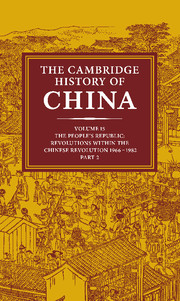Book contents
- Frontmatter
- 1 Mao Tse-tung's thought from 1949 to 1976
- PART I THE CULTURAL REVOLUTION: CHINA IN TURMOIL, 1966–1969
- 2 The Chinese state in crisis
- 3 China confronts the Soviet Union: warfare and diplomacy on China's Inner Asian frontiers
- PART II THE CULTURAL REVOLUTION: THE STRUGGLE FOR THE SUCCESSION, 1969–1982
- PART III THE CULTURAL REVOLUTION AND ITS AFTERMATH
- PART IV LIFE AND LETTERS UNDER COMMUNISM
- PART V THE SEPARATED PROVINCE
- Epilogue: the onus of unity
- Appendixes: meetings and leaders
- Bibliographical essays
- Bibliography
- Index
- Map 1: China’s physical features
- Map 2. PRC: political (Wade–Giles romanization)
- Map 3. PRC: political (pinyin romanization)
- Map 7: Population
- References
3 - China confronts the Soviet Union: warfare and diplomacy on China's Inner Asian frontiers
from PART I - THE CULTURAL REVOLUTION: CHINA IN TURMOIL, 1966–1969
Published online by Cambridge University Press: 28 March 2008
- Frontmatter
- 1 Mao Tse-tung's thought from 1949 to 1976
- PART I THE CULTURAL REVOLUTION: CHINA IN TURMOIL, 1966–1969
- 2 The Chinese state in crisis
- 3 China confronts the Soviet Union: warfare and diplomacy on China's Inner Asian frontiers
- PART II THE CULTURAL REVOLUTION: THE STRUGGLE FOR THE SUCCESSION, 1969–1982
- PART III THE CULTURAL REVOLUTION AND ITS AFTERMATH
- PART IV LIFE AND LETTERS UNDER COMMUNISM
- PART V THE SEPARATED PROVINCE
- Epilogue: the onus of unity
- Appendixes: meetings and leaders
- Bibliographical essays
- Bibliography
- Index
- Map 1: China’s physical features
- Map 2. PRC: political (Wade–Giles romanization)
- Map 3. PRC: political (pinyin romanization)
- Map 7: Population
- References
Summary
During the “active phase” of the Cultural Revolution, up to 1969, China deliberately adopted a low profile in foreign policy, as the country was consumed by internal disorder. The conscious foreign policy of the Cultural Revolution was to have as little of it as possible. China purposely went into diplomatic isolation, kept foreigners out of the country, lowered the level of commercial intercourse with other countries, steered clear of international institutions, and substituted Maoist rhetoric for more tangible means of policy. For a while, China was not a factor of consequence in global politics or even in Asian international relations.
Nevertheless, a chapter on this brief period can illustrate several verities of Chinese foreign policy. Among these are the interdependence and interpenetration of Chinese domestic developments and the international environment. Even though the Cultural Revolution was a period of almost exclusive Chinese attention to internal events, its causes were partly international, its initiation was delayed by occurrences outside China's borders, its effects were felt directly by China's neighbors and strongly even by nations and foreign offices at great distances from Peking, and its direction was abruptly altered by the threat of war in 1969 and after.
Another verity is the dependence of Chinese internal policy and international actions on the policies and actions of the United States and the Soviet Union. American intervention in Vietnam precipitated the strategic debate of 1965 that, in turn, helped divide the leadership along pro- and anti-Cultural Revolution lines; and Soviet intervention in Czechoslovakia in 1968 caused the Chinese leadership to take fright over the Soviet military buildup along the Chinese border and to catch the Soviets off guard with the Chen-pao Island raids early the next year.
Keywords
- Type
- Chapter
- Information
- The Cambridge History of China , pp. 218 - 302Publisher: Cambridge University PressPrint publication year: 1991
References
- 4
- Cited by



